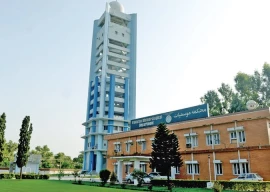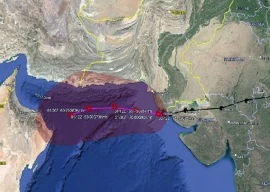
Businesses around the world lobby so that political parties push the former’s agendas. These agendas have at different times included cuts in corporate taxes, relaxation in labour laws, protections for specific industries or good old cash bailouts. Pakistan is no stranger to similar lobbying by interest groups; however, in the land of the pure, the business-government nexus works in peculiar ways.
It is difficult to estimate exactly how much money businesspersons have paid to fund the election campaigns of various candidates. Interviews with executives from the oil, textile, power, pharmaceutical and auto sectors suggest that contributions have, indeed, been made – albeit in personal capacities only.
“No one wants to risk their neck,” the CEO of a denim manufacturing company quite candidly observed. “Pakistan’s politicians are vindictive: they come after us if we are seen close to their opponents. The best way, therefore, is to hand out cash to every political party across the spectrum.”
This across-the-board appeasement policy leaves little room for businesses to condition their funding with specific demands. Hidden from public scrutiny, such collaborations might help a few, but the entire industry never gains much from them.
Gulzar Feroz, vice president of the Federation of Pakistan Chambers of Commerce and Industry (FPCCI), says that distrust between industry groups and political parties runs deep, and has its roots in bitter past experiences.
“This is a country where governments reverse sound economic policies and rollback development projects just to settle scores,” he said, with a certain degree of contempt.
He also chided businesspersons for being too scared. “Sooner or later, we have to come together and make our voice heard at the right forums and at the right time. The best way to do this is to use the FPCCI’s platform and make it stronger,” he offered.
His frustration is not misplaced: despite its status as an apex trade body representing over 100 powerful industry associations and chambers, the FPCCI’s role has been limited to hosting lunches for government officials.
Adil Khattak, chairman of the powerful Oil Companies Advisory Committee, which represents oil refineries and petroleum marketing companies, concurs with the fact that it is risky being seen too close to politicians. “But things have changed over the years, reducing the need to be close to them at all,” he said. “Every civilian government since the late 1980s has encouraged the private sector [independently].”
In the past, businesses needed politicians they could rely on because of ideological divides in politics. “When industries were being nationalised in the 1970s, we simply had to find sympathetic politicians. Things are different now,” he observed.
Still, Khattak is very aware of what politicians can do to industry. After the Pakistan Peoples Party (PPP) came to power in 2008, a drive led by senator Rukhsana Zuberi led to a change in the pricing regime for refineries and oil marketing companies. There was unprecedented criticism of the industry’s profit margins.
“All we want is the consistency of policies,” Khattak explained. “And from time to time we have come together to lobby for that. The creation of the Pakistan Business Council (PBC) is an example of our efforts.” Formed in 2005 by the 14 largest Pakistani enterprises, the PBC is an advocacy group which lobbies for broad economic changes, instead of industry-specific issues.
Haroon Qasim, a member of the Pakistan Pharmaceutical Manufacturers Association (PPMA), was of the view that it might take a few more years before industry learns to effectively lobby for its demands.
“Nevertheless, whenever we have tried, the results have been good,” he said, referring to the PPMA’s drive to push the Drug Regulatory Authority bill through parliament. “We lobbied hard for that. We met different politicians over lunch and meetings and told them our point of view. We finally succeeded.”
Many businessmen point out that Asad Umar’s joining of the Pakistan Tehreek-e-Insaaf (PTI) was a positive change. The former head of Engro Corporation is the most high profile corporate boss to throw his hat in the political ring.
“The fact that he is close to PTI chief Imran Khan says a lot about how businesses and politics should work. Our economy needs broad-based changes in agricultural and manufacturing sectors; Umar’s position at the political helm reflects that things might just be moving in that direction,” said an auto industry executive.
Published in The Express Tribune, May 8th, 2013.
Like Business on Facebook to stay informed and join in the conversation.




1723621875-0/kylie-(1)1723621875-0-165x106.webp)


















COMMENTS
Comments are moderated and generally will be posted if they are on-topic and not abusive.
For more information, please see our Comments FAQ